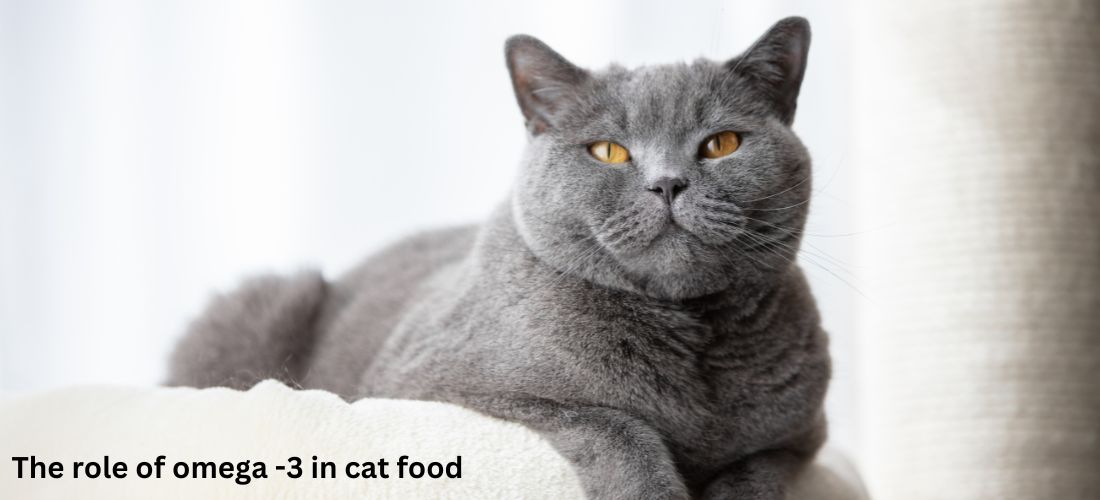The role of omega -3 in cat food plays a vital role in feline health, supporting skin and coat health, reducing inflammation, and promoting brain function. Omega-3 fatty acids are essential for maintaining optimal health in cats, and their inclusion in cat food is crucial for a range of bodily functions and processes. From reducing inflammation to promoting brain function, omega-3 fatty acids are a vital component of a balanced feline diet
What are omega-3 fatty acids?
Omega-3 fatty acids are essential nutrients that play a crucial role in the overall health of dogs and cats. They include docosahexaenoic acid (DHA), eicosapentaenoic acid (EPA), and alpha-linolenic acid (ALA). These polyunsaturated fatty acids can help with anti-inflammatory effects and are important for the well-being of felines of all ages. Omega-3s are commonly found in fish oil supplements and can provide numerous benefits for cats.
benefits of omega -3 in cat food
Omega-3 fatty acids are essential for optimal health in cats, providing benefits such as improved skin and coat health, joint health and mobility, as well as brain and eye health. These fatty acids are often lacking in commercial cat food, making supplements for cats a great option to help your kitten get the omega-3 oils it needs. Including marine sources of omega-3 in their diet can also support joint health and overall well-being.
Omega-3 fatty acids, specifically EPA and DHA, are crucial essential fatty acids that can benefit adult cats as well as kittens. These fatty acids help balance the omega-6 and omega-3 ratio in your cat’s diet, promoting better overall health in many areas such as skin and coat health, joint health, and cognitive function. Including omega-3 supplements in your pet food can help meet the dietary requirements of your cat.
Are omega-3 supplements safe for cats?
Omega-3 supplements are generally safe for cats when given in appropriate doses. These supplements can help improve skin and coat health, reduce inflammation, and support overall wellbeing. However, it’s important to consult with a veterinarian before giving omega-3 supplements to your cat to ensure proper dosage and avoid any potential side effects.
What is the main benefit of omega-3?
Omega-3 is known for its numerous health benefits, with its main advantage being its ability to reduce inflammation in the body. This can help lower the risk of chronic diseases such as heart disease and arthritis. Additionally, omega-3 is crucial for brain health and development, making it an essential nutrient for overall well-being.
source of omega-3 in cats food
Omega-3 fatty acids are essential for cats’ health and well-being, as they cannot produce them on their own. These fatty acids play a crucial role in their diet, along with omega-6 fatty acids. Sources of omega-3 in cats’ food include fish oil and plant-based sources like flaxseed oil. These sources provide various benefits such as improving skin and coat health, reducing inflammation, and supporting overall joint health. Omega-3 fatty acids also contain arachidonic acid, which is important for a cat’s cellular functions.
Incorporating omega-3 fatty acid supplementation into your cat’s diet, whether through fish oil or other polyunsaturated fats, can help your cat meet their fatty acid needs. Additionally, providing these supplements can potentially enhance your cat’s overall health and well-being. It is important to consider the requirements of cats when it comes to fatty acids, as they have specific needs compared to dogs. Ensuring your cat gets enough omega-3 and omega-6 fatty acids can greatly benefit their overall health.
Omega-3 fatty acids are essential for a cat‘s diet, as they cannot be produced in their bodies. The main source of omega-3 in cat food is fish oil, which contains high levels of docosahexaenoic acid (DHA) and eicosapentaenoic acid (EPA). These fatty acids play a crucial role in supporting a cat‘s overall health.
Why is fish oil the best source of Omega-3’s for cats?
Fish oil is the best source of Omega-3’s for cats because it contains high levels of EPA and DHA, essential fatty acids that support skin health, promote a shiny coat, and aid in joint function. Cats are unable to efficiently convert plant-based sources of Omega-3’s, making fish oil a superior choice.
How omega -3 works in cats
Omega-3 for cats plays a crucial role in their overall health. The benefits of omega-3s in a cat’s diet with fish oil include improving coat health, reducing inflammation, and supporting brain function. The omega-3 fatty acid benefits are essential for cats, as they require a proper ratio of omega-6 to omega-3 fatty acids.
Cats and dogs both benefit from omega-3 and omega-6 essential fatty acids in their diets. The fatty acids in dogs are considered necessary for their health, just like in cats. However, fatty acid supplements may be more important for older cats to maintain their overall well-being.
The role of dietary omega-6 and omega-3 fatty acids is significant in ensuring a cat’s good health. Omega-3 fats in their diet can also support the immune system and aid in joint health. Linoleic acid found in these fatty acids can help improve skin and coat condition in cats.
signs of omega-3 Deficiency in cats
Omega-3 for cats is crucial for the health of felines, as these fatty acids are considered essential for their well-being. Without a proper omega-3 intake, cats can suffer from a range of health conditions. If cat owners notice signs of fatty acid deficiency such as dry skin, dull coat, or joint pain, it may be time to give your cat a supplement rich in omega fatty acids.
Remember that cats require sources of EPA and DHA in their diets, and wet food can be a good option to ensure they are getting enough of these important nutrients for cats. Fatty acids can also be supplemented with Omega-3 sources like fish oil or dietary flaxseed in dogs, but cat owners should be cautious of potential adverse effects of over-supplementation.
How to add omega-3 to a cat’s diet?
Omega 3 for cats is essential for their overall health. Fatty acid benefits for cats include promoting a healthy coat, supporting brain function, and reducing inflammation. Cats need a balanced diet that includes omega-3 fatty acids. Properties of omega-3 fatty acids can help improve the health of cats.
Cats lack the ability to produce omega-3 on their own, so it must be added to their diet. Cats also benefit from improved joint health and cardiovascular function when consuming omega-3. Make sure your cat is getting enough omega-3 by including fish oil or supplements in their meals. Many cats can benefit from this simple addition to their diet.
Is it necessary for omega-3 and omega-6 fatty acids to be balanced in a cat’s diet?
Omega-3 and omega-6 fatty acids are crucial for a cat’s overall health, supporting brain function, skin and coat health, and reducing inflammation. It is important that these two types of fatty acids are balanced in a cat’s diet to prevent imbalances that can lead to various health issues.
Conclusion
Omega-3 fatty acids play a crucial role in maintaining feline health by supporting skin, coat, joint, and immune system functions. Incorporating these essential nutrients into cat food can significantly enhance overall well-being and longevity.

